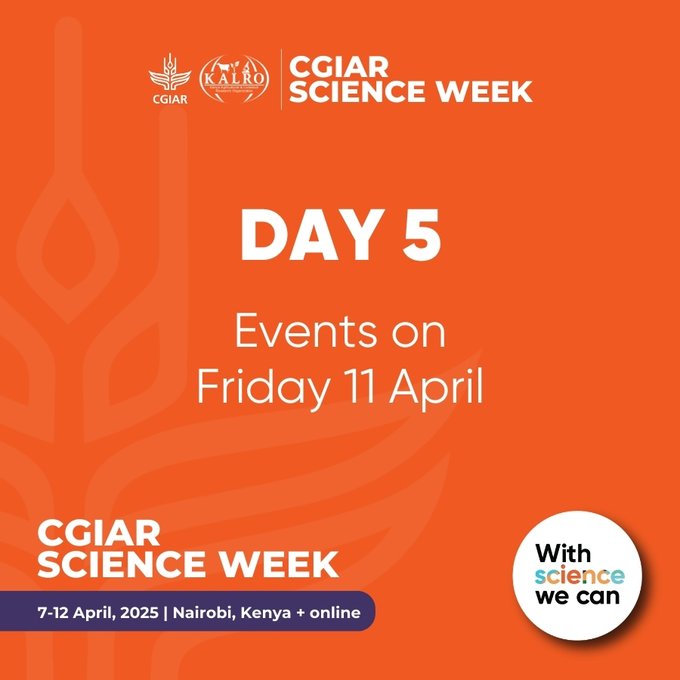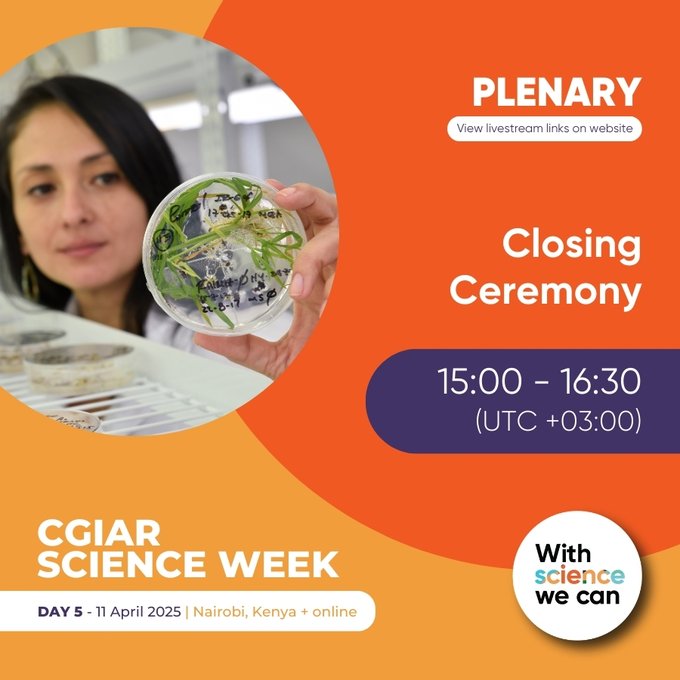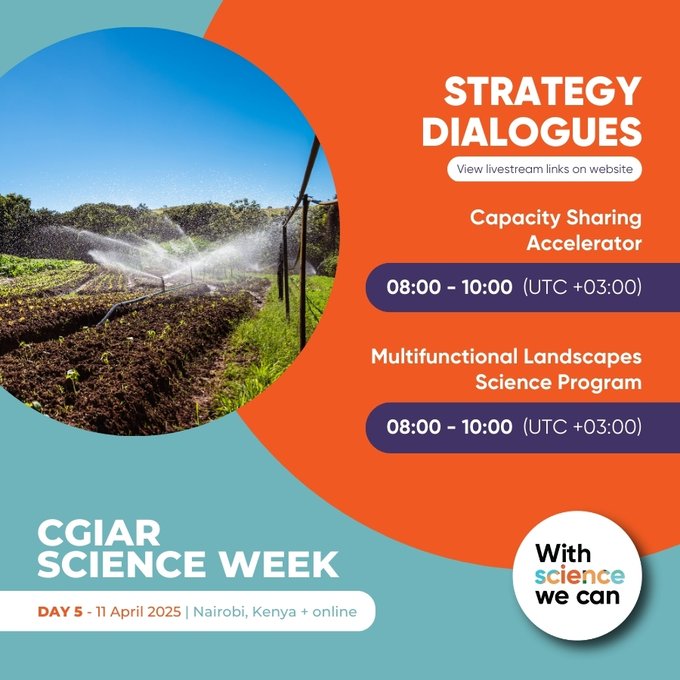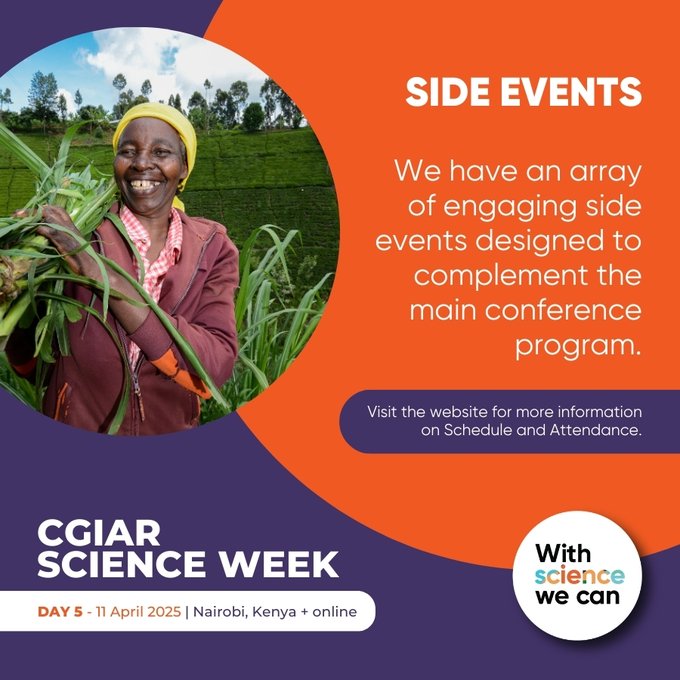NAIROBI, Kenya – The curtains came down on the CGIAR’s inaugural Science Week, marking the end of a weeklong period filled with a cocktail of colourful scientific sessions.
The sessions also featured science, innovation, and cementing of partnerships.
The event held in Gigiri, Nairobi, drew to a close at a ceremony led by Ismahane Elouafi, Executive Managing Director, CGIAR, and Eliud Kireger, Director General, Kenya Agricultural and Livestock Research Organisation (KALRO).
“Over the past days, we’ve explored groundbreaking research, forged new collaborations, and reaffirmed our commitment to creating sustainable, resilient, and equitable food systems,” said Elouafi.
The dialogues and connections, according to Elouafi, fostered at the conference will undoubtedly propel their shared mission forward.
The CGIAR Science Week, co-hosted by KALRO, underscored the transformative power of science when coupled with strategic partnerships. Throughout the event, collaboration took center stage as participants shared technologies and insights and discussed the further development of groundbreaking innovations with the potential to revolutionise agri-food systems – making them more resilient, sustainable, and equitable.
The debates held and the showcasing of science not only illuminated the path forward but also reaffirmed a collective commitment to a food-secure future.
“Through debate, presentations, and presentation of pioneering innovation, Science Week highlighted both the successes we can build on and the gaps that we are better positioned to address. The conversation doesn’t end here. This is just the beginning.” Eliud Kireger, Director General, KALRO.
It’s the final day of #CGIARScienceWeek and we’re closing on a powerful note! Reflecting on the milestones we’ve achieved and looking forward to what’s next in global agricultural innovation. 🎥 Catch the last livestreams 👉 events.cgiar.org/scienceweek#OneCGIAR #WithScienceWeCan
Over the week, several key achievements took place:
- The CGIAR Research Portfolio was launched – an ambitious and collaborative endeavour that builds on 50 years of science and partner networks to shape and focus our vision more sharply than ever through clear parameters and targets.
- CIMMYT and IICA signed an agreement that leverages science, technology, and collaboration to accelerate agricultural innovation and economic growth in the Americas by supporting farmers and agribusinesses.
- CIP and KALRO signed a licensing agreement to transfer biotech for a potato resistant to late blight, reducing the need for chemical inputs while improving productivity and resilience. Significantly, it puts the development of future innovation into the hands of farmers themselves.
- The IWMI Strategy 2024–2030 was launched—a roadmap for research and innovation that will enhance water security throughout East Africa.
- CGIAR and AGRA signed an MOU to accelerate agricultural innovation and delivery across Africa, scaling ideas, strengthening country systems, and providing smallholder farmers with new and affordable technology.
- The CGIAR Flagship Report was released. Designed for decision-makers in low- and middle-income countries and regional bodies engaged in national, regional, and global processes, the report turns CGIAR’s science into actionable, evidence-based solutions to support better decisions and smarter investments.
By building on the momentum of Science Week, CGIAR will drive tangible benefits for communities worldwide by strengthening ties with partners and funders, working to ratify key agreements, and advancing the development and scaling of innovations presented.
“Strategic gatherings like Science Week help chart pathways for how we build sustainable and resilient food systems. With one-third of the global population remaining food insecure and mounting challenges ahead, science must be at the heart of accelerating the urgent solutions we seek,” said H.E. Amina J. Mohammed, Deputy Secretary-General of the United Nations.
What the studies, including those carried out by CGIAR, show
However, a key topic throughout the week was the need to sustain and grow investment streams for agricultural research amid a challenging funding landscape. Numerous studies, including those carried out by CGIAR, clearly demonstrate that agricultural research increases production. Yet, often, science budgets are the first to be cut during periods of economic uncertainty.
“Every $1 invested in CGIAR delivers $10 in benefits. Be it for the sustainability of our planet or out of simple economic sense, investing in CGIAR’s centers and working ever more closely together is one of the smartest investments we can make. In our future, for our future,” said Juergen Voegele, Vice President for Sustainable Development at the World Bank.
Today is the final day of @CGIAR Science Week.our CEO @elianeubalijoro shares key highlights and explains why science and strong partnerships are critical to unlocking transformative solutions for #TreesPeoplePlanet.#CGIARScienceWeek
The world is at a crossroads and cannot meet complex and interconnected challenges without transforming food systems. Yet with the right investment, agriculture, as outlined in the CGIAR Investment Case, has the potential to be humanity’s biggest solution to global agri-challenges.
Investments of $4bn over 2025-2027 are urgently needed to unlock the power of science and innovation to tackle climate change, increase productivity, and help transform food, land, and water systems to be able to address the pressing challenges of today.
By gathering stakeholders, policymakers, experts, innovators, and farmers in one place, Science Week made great inroads into advancing vital themes.
At a time when climate, food, and health systems are under strain, Science Week reaffirmed that science, when guided by purpose and delivered through strong partnerships, has the power to transform, proving that strength lies in collaboration that turns insights into action and action into impact.







